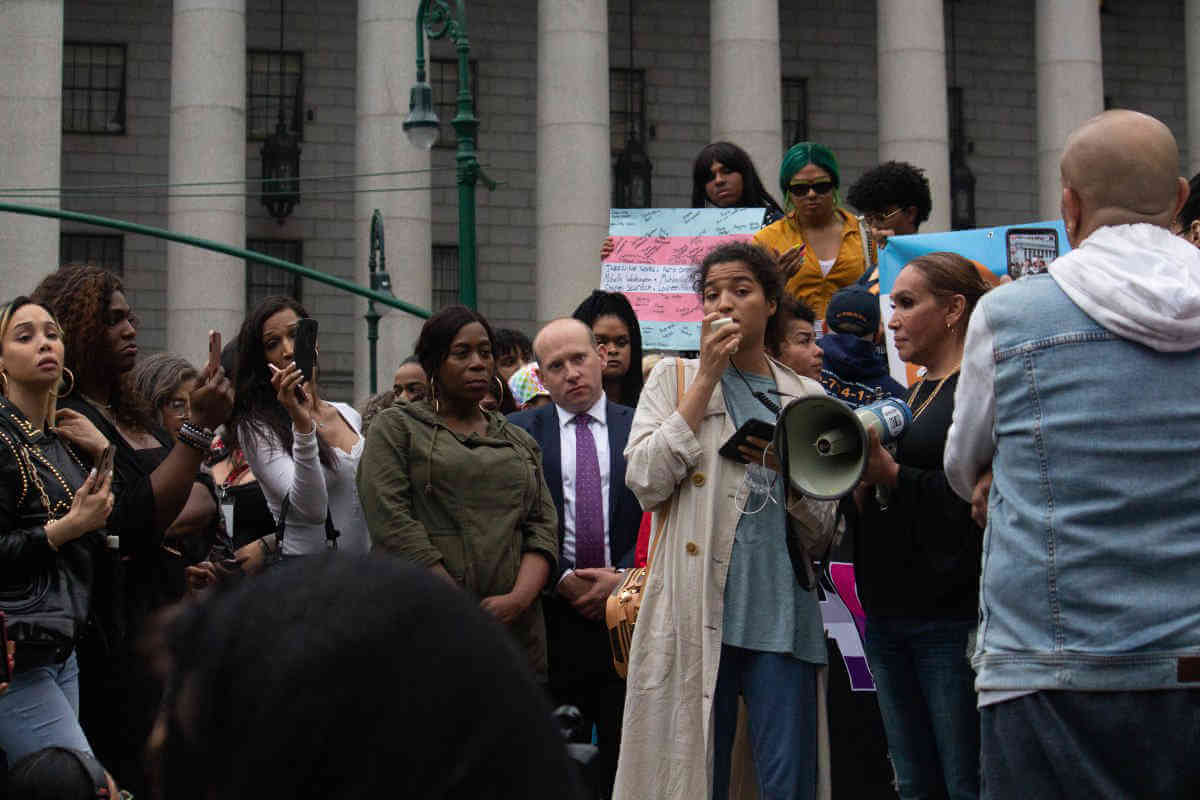The LGBTQ community and the family of a transgender woman of color who died while being held alone in a “restrictive housing” jail cell at Rikers Island are demanding answers about the circumstances surrounding her death.
According to a Department of Correction (DOC) spokesperson, an officer touring a housing area at the Rose M. Singer Center on Rikers Island found Layleen Polanco, 27, unresponsive in her cell at around 2:40 p.m. on June 7. Efforts by emergency medical staff to save Polanco were unsuccessful and she was pronounced dead one hour later.
DOC officials say preliminary reports indicate that foul play was not a factor, but otherwise the agency and the Office of the Chief Medical Examiner (OCME) have not provided further details about what transpired the day Polanco died.
“OCME is continuing to analyze the cause and manner of death in this case, and additional testing is ongoing,” Aja Worthy-Davis, OCME’s executive director for public affairs, said in a written statement. “Trauma was not found to contribute to this fatality. We are now performing additional toxicology and medical examinations to identify other possible factors.”
The DOC referred questions about Polanco’s health to Correctional Health Services (CHS), which handles medical assessment and treatment at DOC facilities. Two CHS spokespersons refused to divulge any details about Polanco’s medical records, citing laws protecting the information.
DOC Commissioner Cynthia Brann said the agency is “conducting a full investigation as the safety and well-being of people in our custody is our top priority.”
Raul A. Contreras, a spokesperson for Mayor Bill de Blasio, said, “We’re working quickly to determine the cause of her tragic death” and that the mayor’s office “will communicate closely with Layleen’s family to ensure they receive the answers they deserve.”
According to the DOC, Polanco was being held in custody for assault and possession of a controlled substance, but reporting by The City contradicted part of that, indicating that she was behind bars for sex work-related charges in addition to the drug charge. She was arrested in April for biting a cab driver and was ordered to be released a few days later, according to the publication, but she faced $500 bail for the aforementioned charges.
The publication reported that the prostitution charges stemmed from when she was issued a desk appearance ticket (DAT) and sent through the highly controversial diversion program, which is intended to serve as an alternative to incarceration by providing services to sex workers, but those who miss just one court date — as Polanco did — can end up behind bars for violating the terms of the program.
“DATs and diversion courts and mandated services — all of these supposed reforms didn’t do anything for Layleen,” Jessica Peñaranda, a DecrimNY steering committee member, said in a written statement. “For Layleen, her missed sessions with the diversion court left her with a criminal record, but also was the reason why she had bail set on her case, and her pretrial incarceration at Rikers is what killed her. We urgently need to decriminalize sex work now — actually decriminalize sex work, not just more reforms that widen the net and tie people up in the criminal legal system — to protect our TGNC communities of color who rely on the sex trade to survive.”
A DOC spokesperson said Polanco was being held in a transgender housing unit before she was moved to the restrictive housing unit. Polanco was in “restrictive housing” because, DOC officials alleged, she assaulted another inmate in custody.
A DOC spokesperson disputed the notion that Polanco was in solitary confinement, which would warrant being locked up for 23 hours per day. Rather, he said, “restrictive housing” allows seven hours outside of the cell per day for programming, services, and entertainment.
But no matter how the DOC tries to frames the housing situation, Polanco was indeed restricted from contact with others for 16 hours per day. Her death adds to a growing number of trans women of color who have died nationwide this year — including multiple trans women who have died after stints in the custody of federal Immigration and Customs Enforcement (ICE).
The DOC is not known for its stellar reputation when it comes to treatment of trans people. The agency recently rejected a proposal from city councilmembers to establish a task force focused on policies surrounding transgender and gender nonconforming people in city jails, and Queens District Attorney candidate Tiffany Cabán, who has worked as a public defender, told Gay City News during an interview in April that she has had trans clients who were unable to afford bail, were placed in solitary for no other reason than their gender identity, and started growing facial hair — a clear sign that hormones were being withheld.
LGBTQ advocates, Polanco’s family, and several elected officials have expressed outrage over Polanco’s death. Polanco’s family issued a public statement through their attorney and had stern words for the city for allowing her to die while in government custody.
“As we gather to mourn this tremendous loss, we are left shocked and outraged by the stony silence from the Department of Correction, mayor’s office, NYPD, and city government,” the family stated. “Just days ago, Mayor de Blasio dedicated a monument to two pioneering transgender activists, telling the trans community that ‘we are sending a clear message: We see you… and we will protect you.’ The city failed to protect Layleen, and now it is trying to sweep her death under the rug. We will not allow it.”
Public Advocate Jumaane Williams, who in the past several years has made it a point to highlight the marginalization of transgender women of color, is calling for immediate action.
“I’m extremely saddened by the death of Layleen, and I offer my prayers for peace and comfort to her friends and family,” Williams told Gay City News in a written statement on June 11. “Layleen is not the first transgender woman to lose her life in the walls of prison, and if we do nothing, she will not be the last. I stand with Layleen’s friends and family in demanding answers, and I will continue to use my position as public advocate to upend a system that could allow this woman — confined in solitary — to lose her life, alone.”
Congressmember Alexandria Ocasio-Cortez, who represents parts of the Bronx and Queens, said in a tweet on June 10 that Polanco’s family deserves to know what happened to her.
“I have met with trans constituents who were put in Rikers,” she wrote. “These women told me about being misgendered upon arrest (even post-surgery) and forced in cells with men, putting them in extreme risk. It’s hard to get treatments, too. Layleen’s family deserves to know what happened to her.”
The Legal Aid Society, which provides legal assistance to those who are living in poverty and represented Polanco, released a statement calling for a full probe into the circumstances surrounding her death.
“Ms. Polanco’s passing is a tragic reminder of the heightened risk and physical and emotional torture that transgender people — especially those from communities of color — face in the criminal legal system, particularly while in custody,” the organization said in a written statement. “Her heartbreaking and untimely death warrants a swift, complete, independent, and transparent investigation from the City. We join New Yorkers in demanding justice for Ms. Polanco, her family, and for her community.”
Hundreds of people gathered in Foley Square downtown on June 10 to call for justice at a rally led by trans women of color, including “Pose” star Indya Moore. Ten trans women spoke along with members of Polanco’s family.
Polanco, whose Facebook page states she was from Yonkers but lived in New York City, was a member of the local ballroom scene, according to Moore, who said they both were members of the house of Xtravaganza.
“I grew up looking to Layleen as my goal,” Moore said in a tweet on June 8. “She was one of the most beautiful women I ever seen who was trans. She and so many other girls were an example to me.”



































